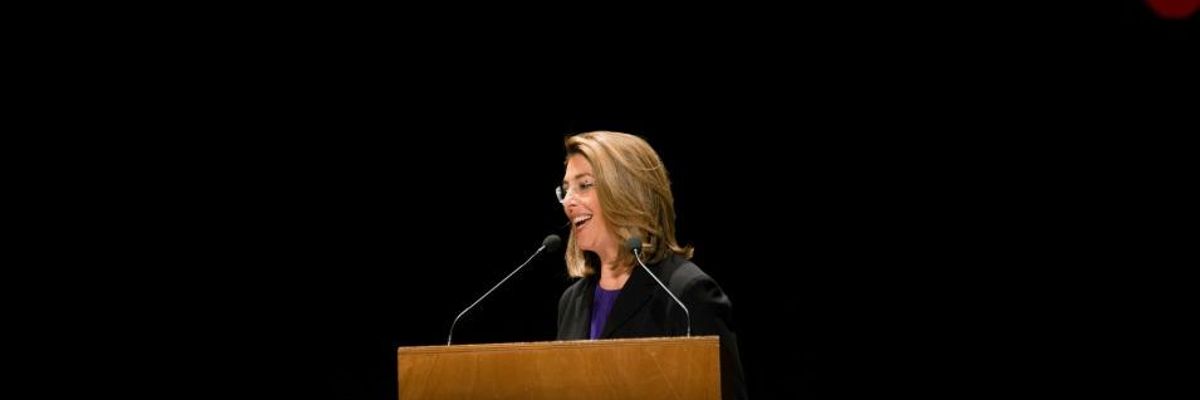Naomi Klein--activist, author, and self-described "secular Jewish feminist"--spoke at the Vatican on Wednesday where she championed the Pope's message for global action on climate change and made the case for "the beautiful world" beyond fossil fuel addiction.
Klein, who was invited to speak by the Vatican, gave her speech ahead of a two-day conference to discuss the Pope's recent encyclical, Laudato Si', on the environment and the threat of the global economic system--subjects that the author of This Changes Everything: Capitalism vs. the Climate knows well.
The encyclical has garnered praise from environmental campaigners like Greenpeace International's Kumi Naidoo, who called it a "clarion call for bold, urgent action."
"Pope Francis writes early on that Laudato Si' is not only a teaching for the Catholic world but for 'every person living on this planet.' And I can say that as a secular Jewish feminist who was rather surprised to be invited to the Vatican, it certainly spoke to me," Klein told reporters ahead of the conference, which is called People and Planet First: the Imperative to Change Course.
She praised what she described as "the core message of interconnection at the heart of the encyclical."
Klein also expanded on what may appear to be an unlikely alliance with the leader of the Catholic Church.
"Given the attacks that are coming from the Republican party around this and also the fossil fuel interests in the United States, it was a particularly courageous decision to invite me here," she said, according to the Associated Press. "I think it indicates that the Holy See is not being intimidated, and knows that when you say powerful truths, you make some powerful enemies and that's part of what this is about."
"In a world where profit is consistently put before both people and the planet, climate economics has everything to do with ethics and morality."
-- Naomi Klein"I have noticed a common theme among the critiques. Pope Francis may be right on the science, we hear, and even on the morality, but he should leave the economics and policy to the experts," Klein said in her speech. "They are the ones who know about carbon trading and water privatization, we are told, and how effectively markets can solve any problem. I forcefully disagree.
"The truth is that we have arrived at this dangerous place partly because many of those economic experts have failed us badly, wielding their powerful technocratic skills without wisdom," she said. "In a world where profit is consistently put before both people and the planet, climate economics has everything to do with ethics and morality. Because if we agree that endangering life on earth is a moral crisis, then it is incumbent on us to act like it."
Echoing the Pope's message to address inequities, Klein said that "our current system is also fueling ever widening inequality."
But Klein stressed that her appearance at the Vatican did not mean that any one world view was "being subsumed by anyone else's."
"This is an alliance on a specific issue. It's not a merger," Klein said. "But when you are faced with a crisis of this magnitude, people have to get out of their comfort zones."
Despite the magnitude of the crisis, Klein stressed: "We can save ourselves."
"Around the world, the climate justice movement is saying: See the beautiful world that lies on the other side of courageous policy, the seeds of which are already bearing ample fruit for any who care to look.
"Then, stop making the difficult the enemy of the possible.
"And join us in making the possible real," she said.
The two-day conference, which comes in the lead-up to the COP21 international climate talks in Paris later this year, is being coordinated by the Pontifical Council for Justice and Peace and the International Cooperation for Development and Solidarity (CIDSE), an alliance of Catholic development agencies. Alongside Klein, other speakers include Ottmar Edenhofer, co-chair of the UN Intergovernmental Panel on Climate Change, pontifical council president H.E. Cardinal Peter Turkson, and CIDSE secretary general Bernard Nils.

